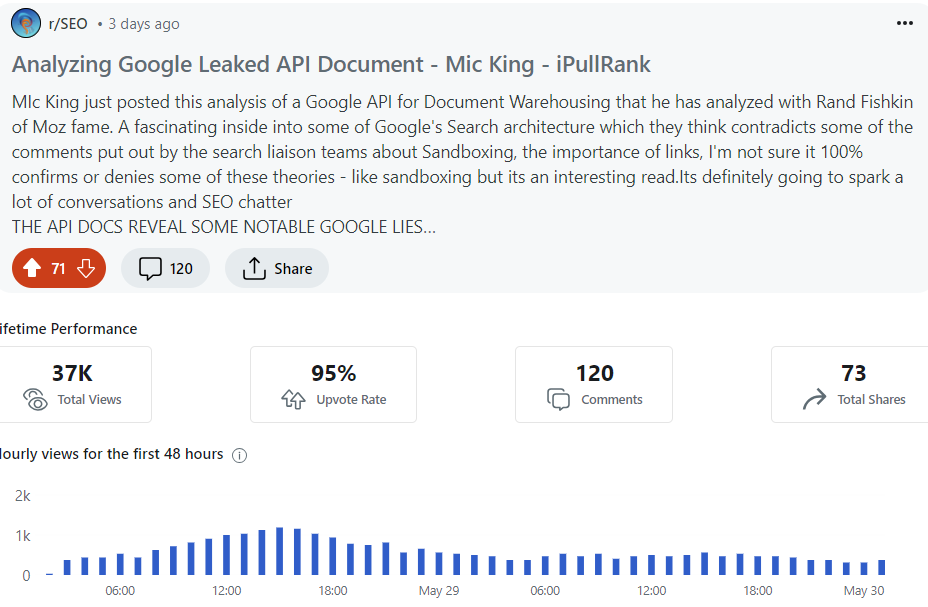Table of Contents
ToggleBreaking the Google Algorithm Leak to Reddit
I was randomly chatting to Mic King while he must have been finalizing his blog post analyzing the Google Document Warehouse API leak, now known as the Google Algorithm leak – a set of 2,700 documents from a document control system (like Github) that had been shared with himself and Rand Fishkin Earlier in the month. Its really a genuine leak and the documents look incredibly close to the terms and concepts closely related to the Google Search Console, Mic tweeted his post and I read it and it looked like a lot of validation and analysis had gone into it, so I broke it on the Reddit SEO Community, the world’s largest SEO Forum “Analyzing Google Leaked API Document“.

Document Warehouse Framework or Search Algorithm?
It looks like this specific set of code was created, maybe as a template or copy of the code base for a what I would describe as a corporate cloud document archive, storage, and retrieval system – possibly a set of services in Google Cloud for app engineers to build their own. Clever – most applications’ native search facilities are terrible. Its really hard to find people on X (twitter) for example, or on Reddit, or in… any site. BEing able to use Google’s amazing search system sounds enticing. A few others commented and posted on X about this similarity too, especially given its name. But its incredibly similar to what you’d expect the Google Search Algorithm to look like. Backlinks, SiteAuthority, Clicks, Page Titles, Countries. If it is a document storage framework – they left way too many WWW search systems in it. The name suggests its a framework but claims on Rand Fishkins post and the Xoogler who leaked it all point to it being a replica or close copy of part of “the Google Algorithm”
Analysis of the Google Leak
A lot of great folks have blogged, created ChatGPT searches and Repository hosts of the documents. I’ll come back and update some of the best resources, but this is a reflection about the aftermath of the algorithm leak.
Does it Show how SEO works?
Kind of. It doesn’t give us any new secrets but it does kill some key SEO myths. Some obvious and recent philosophical SEO Myths and conjecture like EEAT and content rating are non-existent, as we expected. But it hasn’t updated anything else on how to do SEO, except to reinforce standard SEO – PageRank, Content = Relevance, Context is King, internal linking and authority comes from PageRank, that kind of thing = all true.
Did Google Lie?
This seems to be underpinning a lot of the commentary from Mic and Rand, echoed in Barry Schwartz’s cover and sharing of the Official Google Response on SE Journal. I understand – its now apparent (to me at least) that Googlers were namecalling Rand and in particular to a number of SEO concepts like Dwell time and Sandboxing that he appears to have been right about all along.
Are we surprised?
Why are we surprised by Google spokespeople telling some truths/half truths? And this is not a “white knight” defence of Googlers – I’m an SEO, therefore a poacher, not turning gamekeeper anytime soon.
Can we Trust Google’s Search liasons going forward?
Saying that people can’t trust Google or pointing to “Google Says…” isn’t all cut and dry. Nobody questioned PageSpeed – I do, cos my site is slow as hell because it’s a niche blog, and even with 600% growth, its not enough traffic to keep the cache constant. But it also hasn’t affected it enough. But to now refute EVERYTHING Google says is more dangerous. As I’ve tweeted, Google lied about a few things: Using Site Authority, Chrome data, Sandboxing and some other things. And admittedly I totes got Chrome data wrong. And when I read up on the CrUX report, there were questions in the back of my mind that I quashed. 100%. SEO experts lied about Word count, EEAT, content ranking itself, EEAT, Backlinks, Page Title lengths, EEAT. However – Google has always said “Its pretty basic, there is no word count and PageRank is fundamental to the working of the Search Engine” And they re-iterated that the fundamentals haven’t changed to SE Roundtable via
. Saying that Google lied and we can never trust them isn’t 100%. I’m very much with
The real problem: A Rise in New SEO Myths
Dealing with future SEO myths could be harder
Where is the backlash against the smoke & mirrors that SEO “Expert” Speakers and bloggers led?
From my analysis of the Search Algorithm, it confirmed a lot of what was standard SEO. I see more myths created from unsupported conjecture.
There’s No EEAT!
Something I’ve posted a lot about – here, on X and on Reddit, is the complete nonsense that EEAT could be a part of an algorithm – and there’s been very little backlash against this. There has never been any Google documentation to support it – in fact, Google went so far as to ridicule and parody in the Google SEO Starter Guide
When will they recant?
We have to listen to Google but we also can’t suddenly start trusting SEO Myths just because Google lied. There are hundreds of blog posts and talk-decks and SEO “Speakers” on EEAT – yet ANYONE with an ounce of Critical Thinking capability – and you’d think a Professional Writer would fall heavily into this category – could tell that EEAT is something unique to every search and every search user and every time that use does a search. – In the 2024 SEO Starter Guide? ✅
Wordcount =/= a factor – inside the SEO starter guide ✅
Algorithmic content control: No signs of it. Does Google ever profess to this? Not that I’m aware – have a track record going back years on Reddit
Are backlinks Important? ✅ Is this in the SEO Starter Guide? ✅
Do (specifically) content writers diss backlinks and say that their content ranks itself? This is the number one Demand Gen tactic on Reddit and X and their pitches Is this in the SEO Starter Guide? ❌ Is this in the API Leak? ❌




